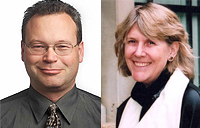Faculty of Health professors Marcia Rioux and Doug Crawford have been awarded the title of Distinguished Research Professor for 2013.
It is an honour that is only conferred on a small number of highly distinguished faculty members who have demonstrated excellent, sustained and continuing contributions to a particular field, and whose work has had a major impact, both at York and internationally. In fact, there can only be 25  active Distinguished Research Professors at York at once. The title is awarded for life and evolves into a Distinguished Research Professorship Emeritus upon retirement.
active Distinguished Research Professors at York at once. The title is awarded for life and evolves into a Distinguished Research Professorship Emeritus upon retirement.
Marcia Rioux
“I am delighted by the wonderful news that Marcia and Doug will receive these very prestigious awards in recognition of their outstanding research and scholarly leadership. They are truly exceptional role models for the Faculty of Health and York University at large,” says Harvey Skinner, dean of the Faculty of Health.
Rioux, director of the York Institute of Health Research, is a professor in the School of Health Policy & Management, teaching in the Graduate Program in Critical Disability Studies. Prior to receiving her Distinguished Professorship, Rioux was awarded the Queen Elizabeth II Diamond Jubilee Medal for her work in and contributions to the field of Critical Disability Studies.
Her latest project will explore key labour market causes of chronic unemployment and poverty of persons with disabilities, primarily in urban areas in three countries: Bangladesh (Dhaka), India (Hyderabad) and Nepal (Katmandu). Rioux received more than $1.6 million in funding from the  Canadian International Development Agency over five years, with a matching donation of $1.3 million from partnership organizations for her research.
Canadian International Development Agency over five years, with a matching donation of $1.3 million from partnership organizations for her research.
Doug Crawford
A professor in the Department of Psychology, as well as the Graduate Program in Biology in the Faculty of Science, Crawford is also a Canada Research Chair in Visual-Motor Neuroscience and chair of the York University Neuroscience Diploma Program. He studies the visual pathways and centres of the brain as a means to understanding the mechanisms of motor control and overall brain activity.
Studying these visual-motor processes is essential for understanding what goes wrong in neurology and neuropsychology patients, says Crawford. He is particularly interested in the spatial aspects of visual-motor control, such as how the brain represents visual space and then transforms this into the patterns of muscular contraction required for accurate movements in 3-D space.
Rioux and Crawford will receive their professorships during Spring Convocation ceremonies June 7.


